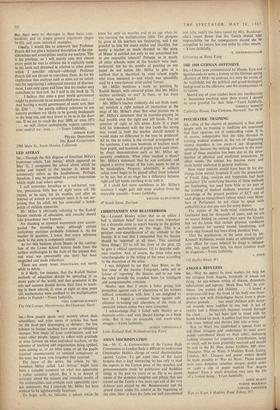PSYCHIATRIC TRAINING SIR,—One of the charms of psychiatry is that
most people with no training in medicine are convinced that their opinions are of outstanding value. It is, of course, indisputable that the time devoted to training medical students in the art of diagnosing mental disorders is too short-1 say 'diagnosing' advisedly, because the striking advances in the treat- ment of these maladies has been due to the intro- duction of physical and medicinal procedures. In other words, the subject has become more and more firmly anchored to general medicine.
How many patients would have been fit for dis- charge from mental hospitals if only the procedures of Freud, Jung, analysts and hypnotists had been available? The underlying' theories of these methods are fascinating, but need form little or no part of the training of medical students, whereas a sound knowledge of the present position of ECT and of such drugs as tranquillisers (about which even Mem- bers of Parliament do not claim to spcak with authority) is a sine qua non for every doctor.
The nature of the body-mind relationship has fascinated men for thousands of years, and we are no nearer finding an answer..than were the Greeks, but we do know that' certain physical conditions are essential for normal mental functioning. and every step forward has been along chemical lines.
That the psychiatrist, in the sense used by Mr. Kenneth Robinson, would make an admirable after- care officer for cases relieved by drugs is indisput- able, but, apart from that, his main function must be diagnosis.—Yours faithfully,














































 Previous page
Previous page